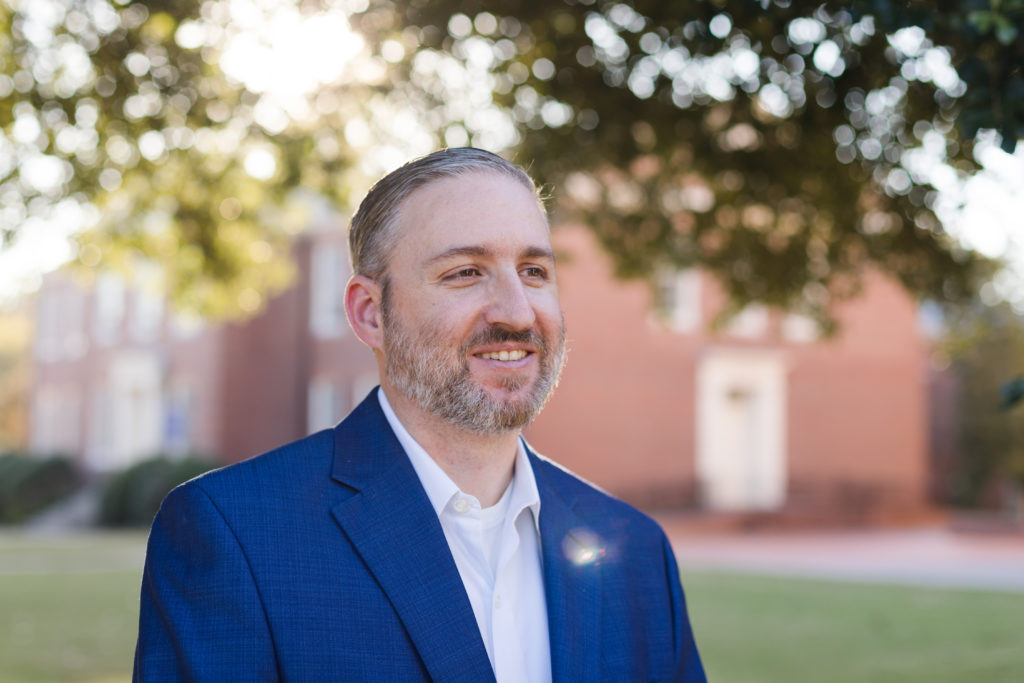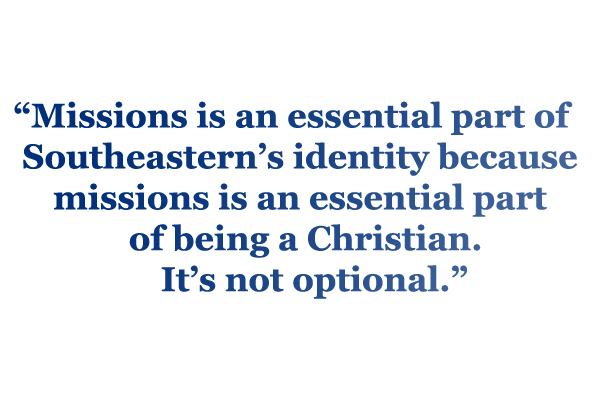Graduation Spotlight: Matthew Hirt
Lauren Pratt | December 08, 2020

Sometimes the trajectory of a person’s life can change over a simple cup of coffee and a significant conversation.
That’s how it was for Matthew Hirt. Sitting in Dr. George Robinson’s living room one morning, the two considered an important missiological question: What do Christians mean when they talk about going to “the nations”? Hirt, who was at the time a current MDiv student preparing to move to South Asia with his wife, was gripped by the question.
“If we’re going to engage in the biblical task of missions, the task should be defined biblically,” said Hirt, who noticed that authors who were writing on the topic were focused primarily on its sociological and anthropological foundations.
 This pressing question would eventually lead him to start his PhD in applied theology at Southeastern Baptist Theological Seminary (SEBTS) in 2016. Through his research, Hirt has worked to sharpen the biblical concepts of place in order to serve the church as it seeks to reach all people with the gospel. His heart to teach and equip believers to both love God and fulfill the Great Commission has been undergirded by the rigor of his theological education. From his MDiv in international church planting to his PhD in applied theology, he has used his education to effectively pastor in the United States and plant churches.
This pressing question would eventually lead him to start his PhD in applied theology at Southeastern Baptist Theological Seminary (SEBTS) in 2016. Through his research, Hirt has worked to sharpen the biblical concepts of place in order to serve the church as it seeks to reach all people with the gospel. His heart to teach and equip believers to both love God and fulfill the Great Commission has been undergirded by the rigor of his theological education. From his MDiv in international church planting to his PhD in applied theology, he has used his education to effectively pastor in the United States and plant churches.
“Missions is an essential part of Southeastern’s identity because missions is an essential part of being a Christian,” said Hirt. “It’s not optional.”
Nestled in a Tibetan Buddhist neighborhood, the couple’s primary role while living in South Asia was to train and equip local pastors and to plant more churches. In an area with one of the fastest growing Christian populations in the world, Hirt saw how the church served as the hands and feet of Jesus. As people in the church met the needs of the hurting around them, they began to see areas of society transformed by the gospel. National believers would hear of families in financial debt who were tempted to sell their children into slavery. However, as the church took on the financial burden of the families around them, human trafficking was completely eradicated in some of these communities.
Hirt also saw how his theological education could provide opportunities to participate alongside local churches in these efforts. His ethics course at Southeastern served as a catalyst for his wife, Heather, to develop a sanctity of life training for women that included discussions on fetal development, human trafficking and women’s health. Hirt saw on the field how knowledge and application go hand-in-hand.
“Southeastern is a wonderful example of this,” said Hirt. “They don’t divorce theological education from the mission of the church. Those two things go together.”
***
The gospel is the center of Hirt’s ministry and what fuels his love for people of all places. This was not always the case. Growing up in rural northern Ohio, he had decided early on as a teenager that he didn’t want anything to do with Christianity. By his freshman year of college, he claimed to be an atheist. Hirt sought to understand the concept of truth as a philosophy major and listened as his professors taught from a postmodern perspective.
However, Hirt could not reconcile the philosophical teaching of his professors with the reality around him. That’s when he met Luke, another student in his Symbolic Logic course. Luke was somewhat of an anomaly to Hirt as he claimed Christianity yet thought deeply and intelligently about his faith. Through their conversations, Luke began encouraging Hirt to read through the Gospel of John. 
One day, Hirt sat with his Bible open to John 14:6 and read Jesus’ bold claim: “I am the way, the truth, and the life. No one comes to the Father except through me.” The weight of this statement resonated deeply with Hirt, eventually leading him to Christ.
“This is either the most absurd or most profound thing that anybody’s ever said,” Hirt remembered thinking to himself.
***
The transformation of the gospel has led to Hirt’s passionate pursuit of leading the local church in the United States to have a heart for the lost in their community, country and world. As an associate pastor in North Vernon, Indiana from 2014-2019, Hirt made it a priority to emphasize the importance of both giving and going as part of the Great Commission. It’s a conviction that he sought to model as he placed himself in volunteer roles in the community in order to interact with non-believers.
“Giving to missions is not a substitute for engaging in missions,” said Hirt.
As Hirt has pursued his PhD, he has seen the need for theological education across the world. After graduation, Hirt and his wife plan to move to Nigeria where they hope to engage in theological education and prepare Nigerian missionaries to go to the nations. Just as Southeastern equipped him to serve the church and fulfill the Great Commission, he also is going to equip Nigerian believers to be theologically grounded and missionally minded.
George Robinson, the Bailey Smith chair of evangelism and associate professor of missions and evangelism at SEBTS, has seen Hirt model in his research and ministry what it means to be a Great Commission Christian.
“Perhaps what I’m most proud of is that I’ve observed him as a student, a field missionary in South Asia and as a pastor here in the U.S,” said Robinson, who served as Hirt’s major professor. “In every one of those roles he has embodies what it means to serve Christ and his mission with his head, heart and hands. Matthew Hirt is what Southeastern prays and works to produce.”